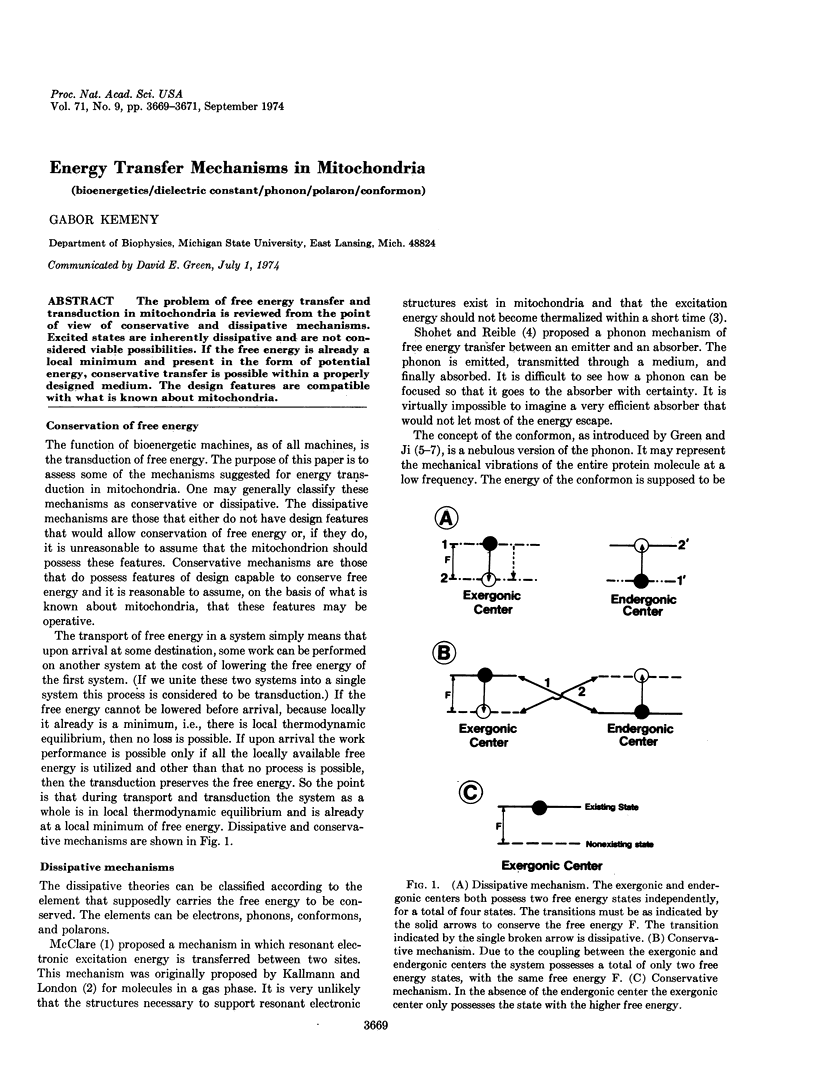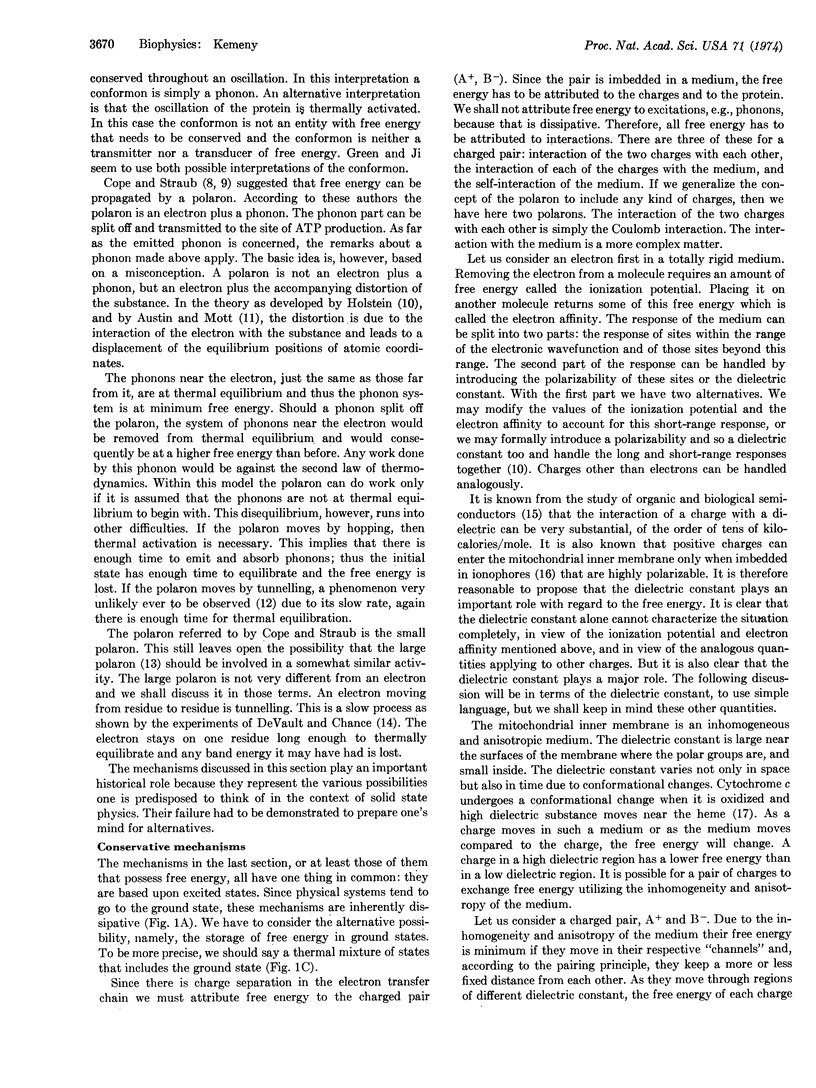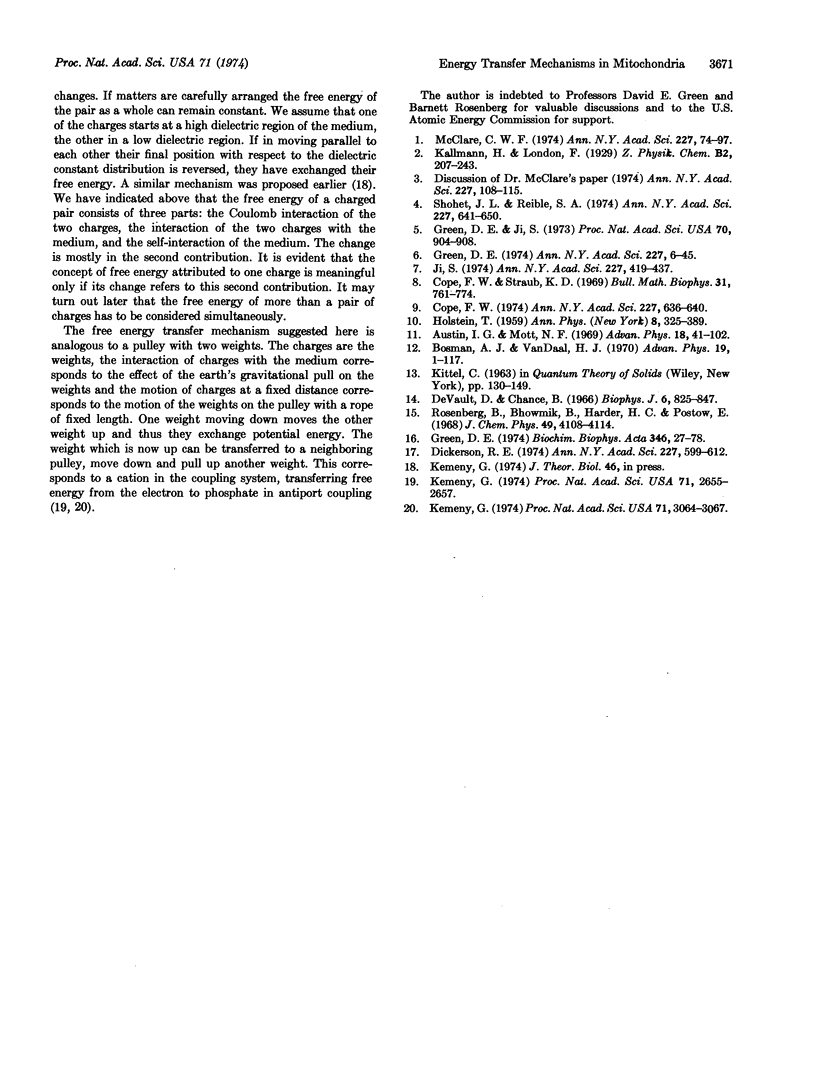Abstract
The problem of free energy transfer and transduction in mitochondria is reviewed from the point of view of conservative and dissipative mechanisms. Excited states are inherently dissipative and are not considered viable possibilities. If the free energy is already a local minimum and present in the form of potential energy, conservative transfer is possible within a properly designed medium. The design features are compatible with what is known about mitochondria.
Keywords: bioenergetics, dielectric constant, phonon, polaron, conformon
Full text
PDF


Selected References
These references are in PubMed. This may not be the complete list of references from this article.
- Cope F. W. Solid state physical mechanisms of biological energy transduction. Ann N Y Acad Sci. 1974 Feb 18;227:636–640. doi: 10.1111/j.1749-6632.1974.tb14428.x. [DOI] [PubMed] [Google Scholar]
- Cope F. W., Straub K. D. Calculation and measurement of semiconduction activation energy and electron mobility in cytochrome oxidase, with evidence that charge carriers are polarons, which may couple oxidation to phosphorylation. Bull Math Biophys. 1969 Dec;31(4):761–774. doi: 10.1007/BF02477785. [DOI] [PubMed] [Google Scholar]
- DeVault D., Chance B. Studies of photosynthesis using a pulsed laser. I. Temperature dependence of cytochrome oxidation rate in chromatium. Evidence for tunneling. Biophys J. 1966 Nov;6(6):825–847. doi: 10.1016/s0006-3495(66)86698-5. [DOI] [PMC free article] [PubMed] [Google Scholar]
- Dickerson R. E. Redox state and chain folding in cytochrome c. Ann N Y Acad Sci. 1974 Feb 18;227:599–612. doi: 10.1111/j.1749-6632.1974.tb14424.x. [DOI] [PubMed] [Google Scholar]
- Green D. E., Ji S. Transductional and structural principles of the mitochondrial transducing unit. Proc Natl Acad Sci U S A. 1973 Mar;70(3):904–908. doi: 10.1073/pnas.70.3.904. [DOI] [PMC free article] [PubMed] [Google Scholar]
- Green D. E. The electromechanochemical model for energy coupling in mitochondria. Biochim Biophys Acta. 1974 Apr 30;346(1):27–78. doi: 10.1016/0304-4173(74)90011-1. [DOI] [PubMed] [Google Scholar]
- Ji S. Energy and negentropy in enzymic catalysis. Ann N Y Acad Sci. 1974 Feb 18;227:419–437. doi: 10.1111/j.1749-6632.1974.tb14405.x. [DOI] [PubMed] [Google Scholar]
- Kemeny G. Charged pair current networks in bioenergetics. Proc Natl Acad Sci U S A. 1974 Aug;71(8):3064–3067. doi: 10.1073/pnas.71.8.3064. [DOI] [PMC free article] [PubMed] [Google Scholar]
- Kemeny G. The second law of thermodynamics in bioenergetics. Proc Natl Acad Sci U S A. 1974 Jul;71(7):2655–2657. doi: 10.1073/pnas.71.7.2655. [DOI] [PMC free article] [PubMed] [Google Scholar]
- McClare C. W. Resonance in bioenergetics. Ann N Y Acad Sci. 1974 Feb 18;227:74–97. doi: 10.1111/j.1749-6632.1974.tb14374.x. [DOI] [PubMed] [Google Scholar]
- Shohet J. L., Reible S. A. Models for energy transduction and transfer in biological systems. Ann N Y Acad Sci. 1974 Feb 18;227:641–650. doi: 10.1111/j.1749-6632.1974.tb14429.x. [DOI] [PubMed] [Google Scholar]



